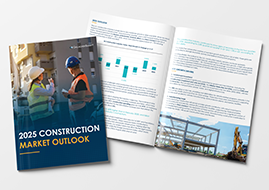
April 2023 — The construction industry is experiencing a shift in the types of claims it encounters and the availability of suitable insurance coverage in the marketplace. Litigation trends, building and labor cost escalation, and supply chain disruptions have heightened the complexity and claims risk in the construction industry. As a result, high-value claims are driving up the cost of insuring construction projects and creating new risk management challenges for contractors.
Now more than ever, construction businesses can benefit from re-evaluating their risk management approach and third-party administrator (TPA) partnerships. They can better navigate these challenges by identifying gaps in their current solutions and outlining key steps to increase success during every phase of the construction project.
The problem with the "traditional" TPA approach
Traditionally, TPA support for the construction market has been based on a two-pronged approach focusing solely on loss mitigation and loss resolution. Unfortunately, this model limits the ability to handle claims efficiently or to create tailored solutions for construction businesses and their employees.
Contractors and construction businesses are required to engage several vendors to properly cover the project lifecycle, from pre-construction to project closeout. Having disparate partners can minimize an organization's oversight, increase the complexity of claims handling, and lead to inefficiencies and mistakes. Essentially, too many moving parts decreases control over the claims and risk management process.
The narrowed approach of most TPAs often completely overlooks the opportunity to positively impact construction businesses' total cost of risk (TCOR) by providing tailored loss prevention solutions. When combined with additional vendor partnerships, this can lead to cost leakage and time inefficiencies.
Below, we identify the four key areas where risk arises, and the resources construction businesses need to have at their disposal to minimize exposure, positively impact TCOR and protect the bottom line.
Loss prevention: minimizing risk
From compliance challenges to ensuring on-site safety, the construction industry is experiencing a staffing and skill set deficiency in the safety and loss prevention space. Construction risk demands focused, well-versed industry professionals that understand the exposure and assumptions within contracts and the nuances of the insurance policies that cover them. Qualified field services, on-site safety managers and experienced technical support personnel should be engaged to provide a wide range of consulting, engineering, risk assessment and quantification, construction management, regulatory compliance, and risk transfer assistance.
Construction businesses can also benefit from partnering with firms that offer risk management tools that leverage data-driven insights to build robust loss control and risk mitigation programs. These programs should focus on safety awareness and provide timely information and updates to decision-makers to help reduce potential claims.
Ultimately, partnering with experts that integrate operational loss prevention solutions delivered by industry-leading construction claims and loss control expertise assists in identifying opportunities to prevent loss and can ultimately reduce the TCOR.
Loss mitigation: controlling claim severity
Mitigating claim severity is crucial for controlling costs in the event of an incident during a project. Construction businesses should look to secure partnerships with claims professionals who receive industry-specific training and are governed by a set of proven best practices. More so, risk partners who offer industry-leading technology within their claims handling services can provide insights into the driving causes of claims and ensure that construction businesses are equipped to address them. When this is the case, every claim and claimant receives the necessary expertise and a seamless experience that prioritizes collaboration and efficiency in claims handling.
The right partner will advocate for a business' inclusion at the earliest opportunity in the lifecycle of a claim, enabling leaders to effectively address an event, mitigate loss impact, and support the completion of projects on time and within budget.
Loss remediation: responding to crisis
A comprehensive claims and risk partner has the ability to respond to a crisis as soon as it occurs. Having a rapid "boots on the ground" response reduces the chance of escalating conditions on the job site, thereby lessening the severity and cost of any claims. A well-rounded partner can deploy environmental, health, and safety (EH&S) specialists, and on-site safety professionals to client offices and job sites to help keep sites safe and provide ongoing support through the lifecycle of a project.
Quick investigative capabilities enable projects to continue as soon as safely possible, protecting employees, the site, the business, and the overall project.
Loss resolution: delivering superior outcomes
When it is time to resolve a claim, construction businesses require a team that can deliver swift issue resolution to claims with the goal of safeguarding business reputation, reducing project slowdown, and mitigating potential future risk.
Claims of varying complexity across the construction spectrum encompass a wide range of nuances. As such, partnering with a firm that has access to construction litigation experts can help construction businesses expedite every level of complex claims through technical specialists, expert witness analysis, litigation preparation, and expert testimony.
GB Construction: A Comprehensive Risk Management Approach
From intake and evaluation through negotiation to settlement, improving cost savings, protecting projects, saving time and mitigating harmful financial impacts are essential. A trusted partner with a track record of industry success in managing complex cases can make all the difference.
Gallagher Bassett (GB) is the preferred partner for clients seeking to minimize the impact and cost of construction-related risks. Our Construction practice delivers this throughout the lifecycle of a project by providing loss prevention, mitigation, remediation and resolution services.
We build trusting, collaborative partnerships backed by expertise and tailored solutions that increase cost savings, efficiency, communication and control throughout the project for our clients. Our scope of services includes risk management, environmental, health and safety management, as well as quality claims handling for workers' compensation, general liability, auto liability and other lines of coverage. Coupled with our industry-leading analytics and RMIS platform, we provide our clients with meaningful insights and trending to optimally manage their exposure to loss.
Our construction expertise spans beyond consultation and advising, encompassing on-site safety services and remediation contracting. Furthermore, our safety and investigative resources have extensive experience supporting contractors and construction managers throughout the full life cycle of a construction project.
Unlike the TPA marketplace, we own the totality of our solutions, removing the need to seek out additional vendors or third parties, making GB the only all-in-one risk management partner for construction businesses. Additionally, we ensure that our capabilities constantly evolve to proactively anticipate exposures in the market and emerging risks our clients face. We deliver a specific, expert-driven approach, rather than applying a general and incomplete solution.
The GB difference is that we empower construction businesses to focus on what matters most.
Author
Make Gallagher Bassett your dependable partner
When making the right decision at the right time is critical to minimize risk for your business, count on Gallagher Bassett's extensive experience and global network to deliver.


